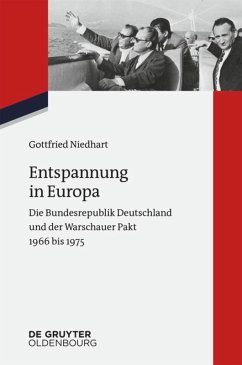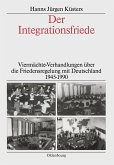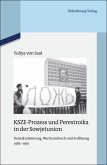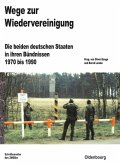Gottfried Niedhart analyzes the key role played by West Germany in the process of détente in Europe, which was understood by the West German political coalitions in power during this period as a means of transcending the status quo. At the same time, he explains the policies of the Warsaw Pact, whose members, unlike West Germany, saw détente as a means of preserving the status quo.
Mitte der 1960er Jahre trat der Ost-West-Konflikt in eine neue Phase ein. Auf die Konfrontation im Kalten Krieg folgte die antagonistische Kooperation in der Ära der Entspannung. Die Bundesrepublik leistete einen wesentlichen Beitrag zu dieser Entwicklung: Sie entschärfte die deutsche Frage, indem sie die territoriale Nachkriegsordnung respektierte. Gottfried Niedhart analysiert die Schlüsselrolle der Bundesrepublik im europäischen Entspannungsprozess, der im Verständnis der Großen wie auch der sozial-liberalen Koalition der Überwindung des Status quo dienen sollte. Zugleich beleuchtet er die Politik des Warschauer Pakts, der zwar kein monolithischer Block war, dessen Mitgliedstaaten aber im Gegensatz zur Bundesrepublik Entspannung als Mittel zur Bewahrung des Status quo verstanden.
Mitte der 1960er Jahre trat der Ost-West-Konflikt in eine neue Phase ein. Auf die Konfrontation im Kalten Krieg folgte die antagonistische Kooperation in der Ära der Entspannung. Die Bundesrepublik leistete einen wesentlichen Beitrag zu dieser Entwicklung: Sie entschärfte die deutsche Frage, indem sie die territoriale Nachkriegsordnung respektierte. Gottfried Niedhart analysiert die Schlüsselrolle der Bundesrepublik im europäischen Entspannungsprozess, der im Verständnis der Großen wie auch der sozial-liberalen Koalition der Überwindung des Status quo dienen sollte. Zugleich beleuchtet er die Politik des Warschauer Pakts, der zwar kein monolithischer Block war, dessen Mitgliedstaaten aber im Gegensatz zur Bundesrepublik Entspannung als Mittel zur Bewahrung des Status quo verstanden.








